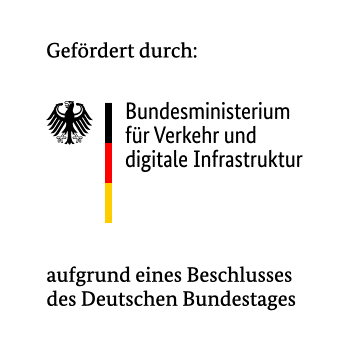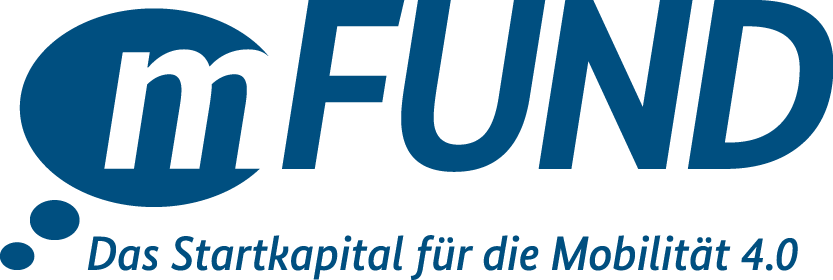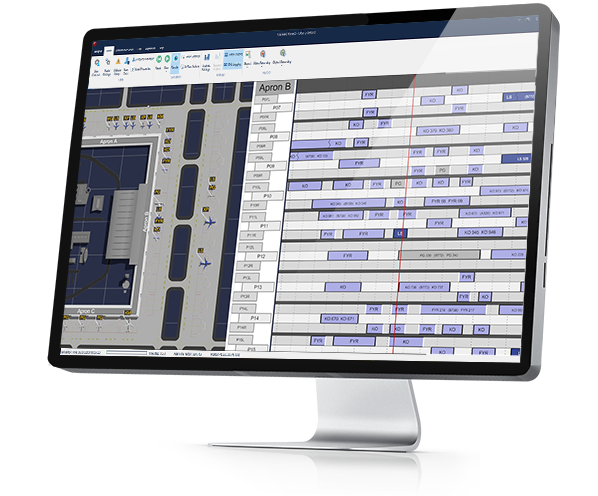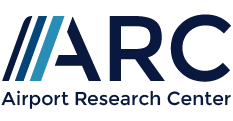A-BOOST – Next Generation Stand & Gate Allocation
– – – Für deutsche Version nach unten scrollen – – –
The mFund project‚ A-Boost – Next Generation Allocation‘, was kicked-off at 1st Jan 2021 to take aircraft stand allocation at airports to a new level by applying Artificial Intelligence (AI) based data analysis methods for the first time in this context.
It is being funded by the German Federal Ministry of Transport and Digital Infrastructure as part of the Modernization Fund (‘mFUND’) with a total of 99,191 euros.
Airport Research Center GmbH and Amsterdam University of Applied Sciences cooperate as research partners in this project. With Zurich Airport, an industrial partner is involved that contributes the requirements from operations as well as possible application scenarios.
The goal of the project is to apply machine learning, optimization, and simulation techniques to improve resource allocation at an airport. In particular weather data provided by the mCLOUD will be used for this purpose. Finally, the functional scope of the industrial software product ‘CAST Stand Allocation’ developed by Airport Research Center GmbH is to be expanded.


The allocation methods to be developed aim to optimize resource allocation. On the one hand, this reduces delays and hold-ups and, on the other, it shortens taxiing times and routes for aircraft. The reduction of delays is not only beneficial for passengers, but also has positive impact on all further participants (airport, handling service provider, airline, air traffic control, etc.) at the local airport and, beyond that, in the whole air traffic network. The reduction of delays is therefore a primary goal in aviation, which is pursued by numerous initiatives. Shorter operating and engine running times also result in corresponding reductions in environmental impact (CO2, air and other pollutants, noise).
Within the actual project work, ARC will collect and process historical weather and flight data from a real airport. This data is analyzed using machine learning techniques to predict the expected schedule variance of future flights based on constraints such as weather, fleet mix, slots (takeoff and landing time windows), time of year, etc. In parallel, allocation algorithms are designed that – beyond the regular boundary conditions such as aircraft size or airline preferences – take into account the predicted flight delay and use optimization procedures to perform a better allocation of flights to stand locations.
About the mFUND research initiative of the Federal Ministry of Transport and Digital Infrastructure (BMVI):
As part of the mFUND research initiative, the Federal Ministry of Transport and Digital Infrastructure has been funding research and development projects relating to data-based digital applications for mobility 4.0 since 2016. In addition to financial support, the mFUND also supports networking between stakeholders from politics, industry and research with various event formats and access to the mCLOUD data portal.

Tools used
CAST Stand & Gate Allocation
- Optimizing an allocation for given objectives and restrictions
- Increasing peak hour capacity to provide more slots
- Calculating the stand demand a for a future schedule
- Balancing contradicting objectives like contact stand utilization vs. number of towings
- Dealing with blocked stands during constructions
Optimierung der Flugzeug Standplatz-Allokation durch KI-basierte Datenanalyse
Das am 01.01.2021 gestartete mFund-Projekt „A-Boost – Next Generation Allocation” befasst sich mit der Optimierung der Flugzeug-Standplatzallokation an Flughäfen durch KI-basierte Datenanalyse.
Es wird im Rahmen der Förderrichtlinie Modernitätsfonds („mFUND“) durch das Bundesministerium für Verkehr und digitale Infrastruktur mit insgesamt 99.191 Euro gefördert.
Durchgeführt wird das Projekt durch die Airport Research Center GmbH und die Amsterdam University of Applied Sciences. Mit dem Flughafen Zürich ist ein industrieller Partner beteiligt, der Anforderungen aus dem operativen Betrieb sowie mögliche Anwendungsszenarien beisteuert.
Ziel des Projektes ist es, Techniken des maschinellen Lernens, Optimierung und Simulation für die Verbesserung der Ressourcenallokation an einem Flughafen einzusetzen. Hierfür sollen durch die mCLOUD zur Verfügung gestellte Wetterdaten genutzt werden. Der Funktionsumfang des von der Airport Research Center GmbH entwickelten industriellen Softwareprodukts „CAST Stand Allocation“ soll erweitert werden.


Die zu entwickelnden Allokationsmethoden zielen auf eine optimierte Ressourcenzuweisung ab. Hierbei werden zum einen Verspätungen und Verzögerungen reduziert und zum anderen Rollzeiten und Wege für Luftfahrzeuge verkürzt. Die Reduktion von Verzögerungen ist nicht nur vorteilhaft für die Passagiere, sondern wirkt sich durch die Vernetzung auf alle Prozessbeteiligten (Flughafen, Abfertigungsdienstleister, Airline, Flugsicherung, etc.) im Flughafenumfeld und darüber hinaus auch im Luftverkehrsnetz aus.
Die Reduktion von Verzögerungen ist daher in der Luftfahrt ein unbestrittenes Primärziel, welches von zahlreichen Initiativen verfolgt wird. Über kürzere Betriebs- und Triebwerkslaufzeiten ergeben sich auch entsprechende Reduktionen in der Belastung der Umwelt (CO2, Luft- und andere Schadstoffe, Lärm).
In der konkreten Umsetzung werden historische Wetter- und Flugplandaten eines realen Flughafens gesammelt und aufbereitet. Diese werden mittels Machine-Learning-Techniken analysiert, um auf Basis von Randbedingungen wie Wetter, Flottenmix, Slots (Start- und Landzeitfenster), Jahreszeit etc. die erwartete Planabweichung zukünftiger Flüge vorherzusagen.
Parallel werden Allokationsalgorithmen entworfen, die – über Randbedingungen wie Flugzeuggröße oder Airline-Präferenzen hinaus – insbesondere die prognostizierte Flugverspätung berücksichtigen und mittels Optimierungsverfahren eine optimierte Zuordnung von Flügen zu Standplätzen durchführen.
Über den mFUND des BMVI:
Im Rahmen der Forschungsinitiative mFUND fördert das BMVI seit 2016 Forschungs- und Entwicklungsprojekte rund um datenbasierte digitale Anwendungen für die Mobilität 4.0. Neben der finanziellen Förderung unterstützt der mFUND mit verschiedenen Veranstaltungsformaten die Vernetzung zwischen Akteuren aus Politik, Wirtschaft und Forschung sowie den Zugang zum Datenportal mCLOUD.




